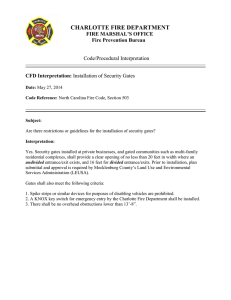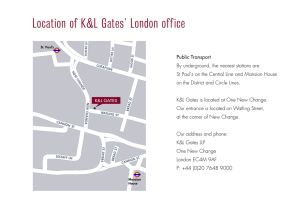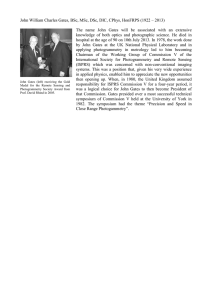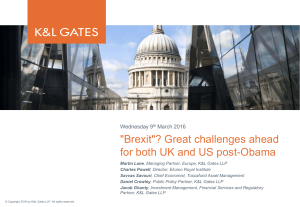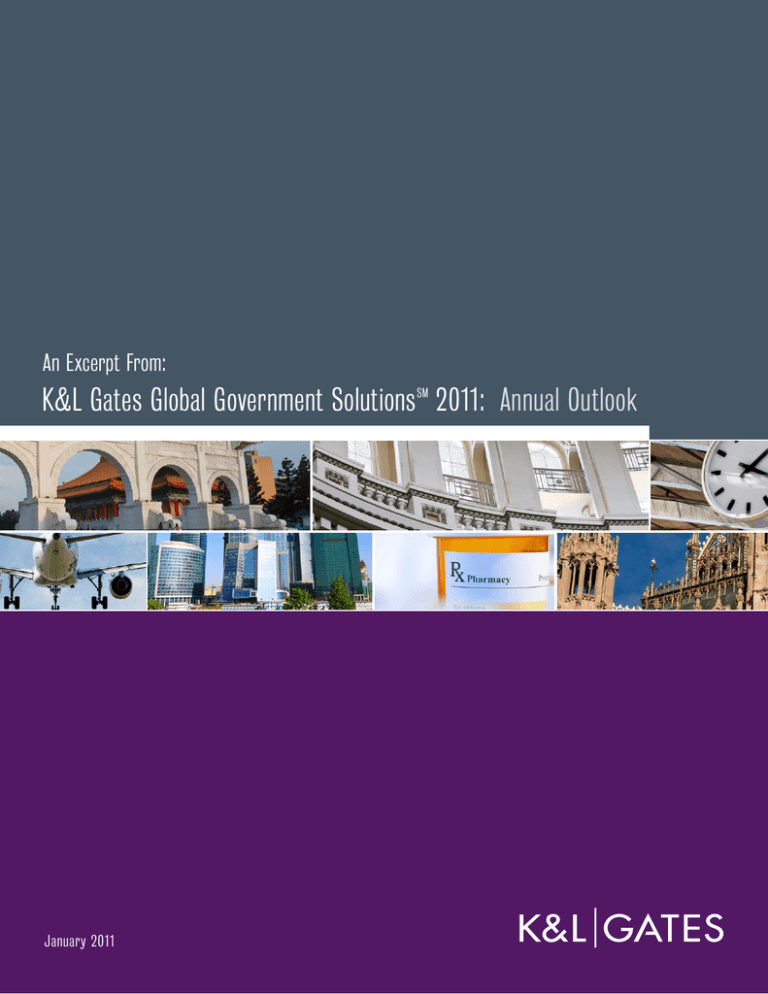
An Excerpt From:
K&L Gates Global Government Solutions SM 2011: Annual Outlook
January 2011
Regulatory
Employers Face Scrutiny in 2011: Systemic Litigation and Fair Labor Standards
With the Obama administration’s legislative agenda on labor and employment law
largely stalled, enforcement efforts under existing statutes are expected to expand
and accelerate in 2011. The Equal Employment Opportunity Commission (“EEOC”
or “Commission”) and the U.S. Department of Labor (“Department” or “USDOL”) have
both announced aggressive enforcement and litigation goals for which employers
should be prepared.
At the EEOC, Chairman Jacqueline
Berrien has vowed to reduce the
Commission’s backlog in charge
processing and to reinvigorate its
Systemic Litigation Initiative. With
increased funding and 383 new
employees, including 41 attorneys, the
agency is poised to do both. According
to the Commission’s report for fiscal
year 2010, which ended on September
30, systemic litigation will be a top
priority. It points to 20 such suits filed in
the past fiscal year. Even more telling for
the year to come, it discloses that 465
systemic investigations were in process
at year-end.
Of particular import for employers is
the Commission’s stated intent to focus
systemic litigation on “policies and
procedures, employment actions, or
practices in particular industries that may
have a significant or adverse impact
on protected groups.” The emphasis on
adverse impact claims can be particularly
difficult for employers, because those
claims do not involve discrimination
in the traditional sense of intentionally
treating employees differently because
of a protected characteristic, such as
race, sex or national origin. Rather,
disparate impact claims attack facially
neutral – and often well-intended
and longstanding – policies because
they may affect protected employees
disproportionately. Among the faciallyneutral policies identified by the EEOC as
possible targets of disparate impact suits
are the use of credit reports in hiring or
other employment decisions, the use of
42
arrest or conviction records, employment
tests, subjective decision making, and
exclusions based on names, zip codes or
geographic areas.
The use of credit reports is a particular
target of the Commission in litigation
and was addressed in a recent public
meeting. Although various employer
representatives presented arguments in
support of the use of credit checks, the
position of the Commission appears
clear. According to Chairwoman
Berrien, the practice fails as a matter of
law and policy. She cites it as unfair to
individuals whose credit slipped after
layoff during the economic downturn.
She cites it as potentially illegal because
it may impact protected groups such as
African Americans, Hispanics, women
and the disabled disproportionately. The
chairwoman’s willingness to address
whether certain employment practices
are fair (and not just whether they
comply with the statutes she is charged
to enforce), along with the suggestion
that “subjective decision-making” may be
a target of agency litigation, is a clear
signal to the business community of the
current EEOC’s perception of the scope
of its role.
Any doubt as to the EEOC’s intent
to litigate is dispelled by a note in
connection with its E-RACE initiative
(Eradicating Race And Colorism
from Employment). In what could be
interpreted as pressure to compel
regional offices to file suit, the
Commission states that regional offices
will be reviewed to determine whether
K&L Gates Global Government Solutions SM 2011 Annual Outlook
the number of cases filed is “reasonable”
when compared with the number of
meritorious charges processed.
Like the EEOC, the USDOL under the
Obama administration has adopted
an operational approach that should
cause great concern for employers.
The USDOL is engaging in a publicity
campaign focused on alleged “wage
theft” and the wrongs suffered by lowwage workers. It has abandoned its
historic role of providing fact-specific
guidance to employers on how to
comply with the Fair Labor Standards
Act (“FLSA”); it is hiring a broad range of
new investigators; and it has promised
an aggressive litigation-first approach
to enforcement. Although it is uncertain
whether the USDOL’s approach will
increase compliance with the FLSA, there
can be no doubt that every employer will
face greater scrutiny from the department
and the plaintiffs’ bar in an effort to
identify wage violations.
Spurred on by a 2009 GAO Report that
concluded that the Bush administration
“left thousands of actual victims of wage
theft … with nowhere to turn” and a
2009 National Employment Law Project
study that indicated 68 percent of the
low wage workers surveyed reported
that they were denied minimum wage or
overtime, Secretary of Labor Hilda Solis
has repeatedly committed to address
“wage theft” issues. Thus, in April
2010, USDOL launched its “We Can
Help” initiative. This initiative involves a
public outreach program for low wage
workers, especially illegal aliens, and is
aimed at encouraging employees and
community groups to report “suspected”
wage violations. One of the cornerstones
of the initiative is a commitment that
complaining employees will not suffer
retaliation, which seemingly includes a
Regulatory
commitment that the USDOL will not take
any action to report or deport illegal
aliens for whom it seeks wages.
At the same time that the USDOL is
encouraging complaints about noncompliance, it has dramatically reduced
the avenues through which employers
may obtain compliance assistance.
The department historically provided
detailed opinion letters in response
to inquiries from employers and other
interested parties that addressed difficult
compliance issues based on the specific
facts presented by the requesting party.
Thus, an employer that wanted to comply
with the law could outline an approach
or issue and obtain a determination from
the USDOL as to whether the approach
complied with the law. Unfortunately, in
March 2010, the USDOL announced
that it would no longer issue such opinion
letters. The department indicated that
responding to compliance inquiries
absorbed too many resources that could
otherwise be redirected to investigations
and enforcement activities.
With additional appropriations as well
as the funds that the USDOL has saved
by minimizing its compliance guidance,
the department is in the process of hiring
hundreds of new investigators. A large
group of these investigators is tasked
with addressing contract compliance
issues under the Davis-Bacon Act, which
covers public works and construction
projects, and the Service Contract
Act, which covers services contractors
who receive federal funds. Other
new investigators are focusing on the
perceived misclassification of employees
as independent contractors, and still
others are focusing on USDOL-designated
high-risk industries, such as construction,
health care, transportation, janitorial, and
personal services.
are the best deterrent we can have”
and explained that her goal is to make
USDOL enforcement “more aggressive,
creative, and effective.” Although it is
difficult to assess the impact of such
attitudes both within and outside of the
Department, a review of federal court
dockets suggests that there has been
more than a 10 percent increase in FLSA
lawsuits filed when comparing 2010
with 2009. There are now an average
of 33 such matters filed every day. As
new USDOL investigations move forward
and as plaintiffs’ counsel continue to be
emboldened, those numbers are certain
to increase further.
In light of these steps by the USDOL, it
should be no surprise that Labor Solicitor
M. Patricia Smith has emphasized
that the department intends to achieve
legal compliance through use of a big
stick. In a recent speech, she argued
that “a few well-placed criminal cases
Patrick M. Madden (Seattle)
patrick.madden@klgates.com
Rosemary Alito (Newark)
rosemary.alito@klgates.com
K&L Gates Global Government Solutions SM 2011 Annual Outlook
43
Anchorage
Los Angeles
San Diego
Austin
Miami
Beijing
Berlin
Moscow
San Francisco
Boston
Newark
Seattle
Charlotte
New York
Shanghai
Chicago
Dallas
Orange County
Singapore
Dubai
Palo Alto
Fort Worth
Paris
Spokane/Coeur d’Alene
Frankfurt
Pittsburgh
Taipei
Tokyo
Harrisburg
Portland
Raleigh
Hong Kong
London
Research Triangle Park
Warsaw Washington, D.C.
K&L Gates includes lawyers practicing out of 36 offices located in North America, Europe, Asia and the Middle
East, and represents numerous GLOBAL 500, FORTUNE 100, and FTSE 100 corporations, in addition to growth
and middle market companies, entrepreneurs, capital market participants and public sector entities. For more
information, visit www.klgates.com.
K&L Gates comprises multiple affiliated entities: a limited liability partnership with the full name K&L Gates LLP qualified in Delaware and maintaining offices
throughout the United States, in Berlin and Frankfurt, Germany, in Beijing (K&L Gates LLP Beijing Representative Office), in Dubai, U.A.E., in Shanghai (K&L Gates
LLP Shanghai Representative Office), in Tokyo, and in Singapore; a limited liability partnership (also named K&L Gates LLP) incorporated in England and
maintaining offices in London and Paris; a Taiwan general partnership (K&L Gates) maintaining an office in Taipei; a Hong Kong general partnership (K&L Gates,
Solicitors) maintaining an office in Hong Kong; a Polish limited partnership (K&L Gates Jamka sp.k.) maintaining an office in Warsaw; and a Delaware limited
liability company (K&L Gates Holdings, LLC) maintaining an office in Moscow. K&L Gates maintains appropriate registrations in the jurisdictions in which its offices
are located. A list of the partners or members in each entity is available for inspection at any K&L Gates office.
This publication is for informational purposes and does not contain or convey legal advice. The information herein should not be used or relied upon in regard to
any particular facts or circumstances without first consulting a lawyer.
©2011 K&L Gates LLP. All Rights Reserved.



